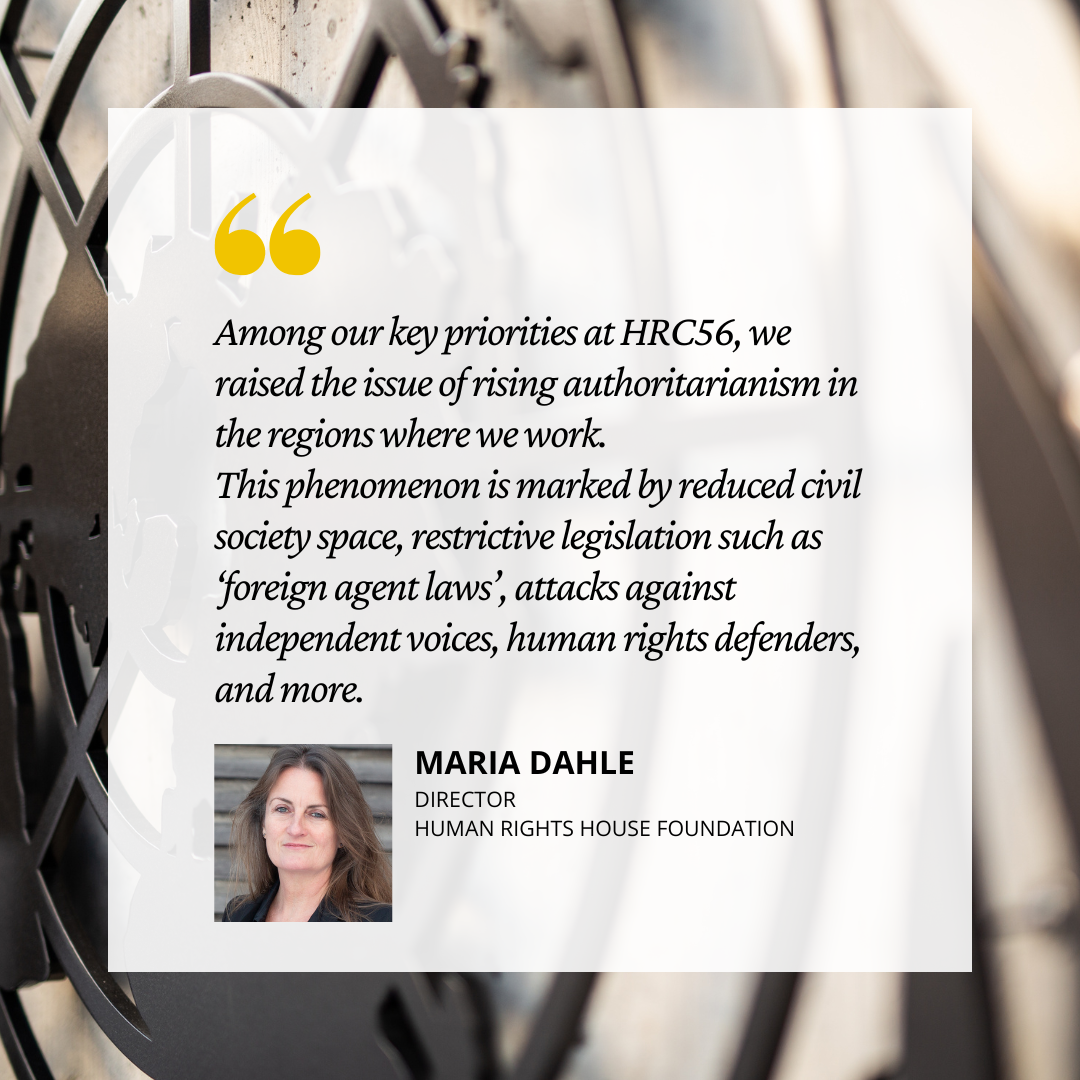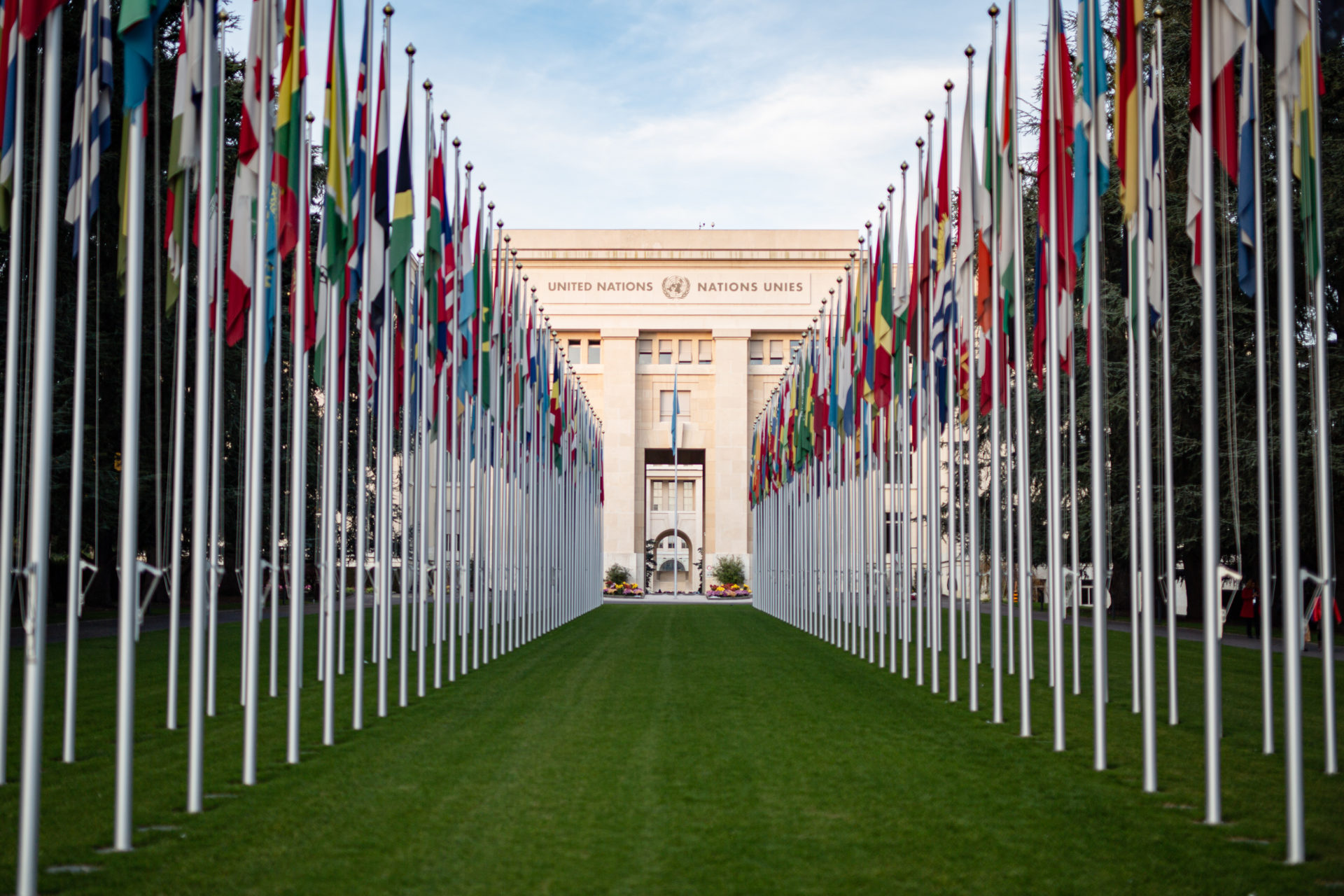
Throughout HRC56, HRHF worked closely with members of the Network of Human Rights Houses, as well as advocacy partners representing INGOs and NGOs from Azerbaijan, Belarus, Bosnia and Herzegovina, Croatia, Georgia, Russia, and Ukraine.
Together, we raised key human rights issues from the region and called for action through joint statements, side events, and engagement with key mechanisms.
Rising authoritarianism

On 1 July, HRHF hosted “Rising Authoritarianism” featuring partners from Azerbaijan, Bosnia and Herzegovina, and Georgia, as well as Gina Romero, the newly-appointed UN Special Rapporteur on the rights to freedom of assembly and of association.
The side event was co-sponsored by CIVICUS, European Centre for Not-for-Profit Law, FIDH, Human Rights House Banja Luka, Human Rights House Tbilisi, Human Rights Watch, IBAHRI, ICJ, and World Movement for Democracy.
Panellists highlighted the regular violation of freedom of assembly by Azerbaijani authorities, a “crisis of democracy” in Georgia, and authorities in Bosnia and Herzegovina’s Republika Srpska working actively to undermine the legitimacy and credibility of independent civil society. HRHF also highlighted, through an empty seat, the detention of Anar Mammadli, who was arrested shortly after participating in the previous session of the Council.
At @HRHFoundation #HRC56 side event on rising authoritarianism, we have an empty seat on the speakers’ dais. Anar Mammadli would be here, highlighting Azerbaijan’s appalling human rights record, were it not for his imprisonment by the authorities. pic.twitter.com/FL9wWAUdzx
— Dave Elseroad (@delseroad) July 1, 2024
Freedom for Anar Mammadli and all political prisoners in Azerbaijan
In addition to the empty chair at our side event, HRHF again raised the detention of Anar Mammadli within the context of a statement around an interactive dialogue with the UN Special Rapporteur on climate change.
HRHF argued that Anar Mammadli’s detention should be understood as a direct reprisal for his legitimate election observation efforts and human rights work, and comes in the context of a dramatic deterioration in the human rights situation in Azerbaijan. HRHF noted that Mammadli’s arrest was connected to his advocacy work ahead of COP29, including leading a campaign entitled “Climate of Justice”, highlighting the human rights situation and the country’s lack of progress towards climate-related goals.
HRHF repeated its calls for the release of Mammadli and all political prisoners in Azerbaijan.
“Georgian civil society needs support now.”
HRHF welcomed Gina Romero into her position as the new UN Special Rapporteur on the Rights to Freedom of Peaceful Assembly and of Association and asked how the Council can best ensure freedom of peaceful assembly and association is upheld, even in contexts such as Georgia that are witnessing rising authoritarian tendencies.
In its statement, HRHF raised the Georgian Parliament’s adoption of Law on Transparency of Foreign Influence in May, inspired by the Russian authoritarian-style “foreign agent” legislation, as well as underlining the importance of supporting civil society in the country.
Quoting HRHF’s recent interview with Georgian human rights defender Baia Pataraia (director of Sapari which is a member organisation of Human Rights House Tbilisi), HRHF reminded the Council that Georgian civil society needs “support now. Not in six months, one year… now.”
Maintaining a spotlight on the human rights crisis in Eastern Europe
On 3 July, HRHF thanked Anaïs Marin for her years of tireless work as UN Special Rapporteur on the human rights situation in Belarus, during her last interactive dialogue at the Council as the mandate holder. In its statement, HRHF drew attention to Belarus’ ongoing attacks on citizens that have been forced into exile, including Belarusian filmmaker Andrey Gnyot, from Serbia to Belarus, and the trial and sentencing, in absentia, of human rights defender Leanid Sudalenka and journalist Hanna Liubakova.
On 10 July, HRHF delivered a statement on human rights in the temporarily occupied territories of Ukraine. HRHF welcomed the release of Nariman Dzhelal, the first deputy chairman of the Mejlis of the Crimean Tatar People, and repeated calls for the release of detained human rights defender Server Mustafayev. HRHF also raised concerns about the situation of forced transfers of Ukrainian civilians within the temporarily occupied territories of Ukraine and to the Russian Federation.
Concerns related to freedom of expression in Serbia
In the context of an interactive dialogue with the Special Rapporteur on the right to freedom of expression, HRHF underlined several concerns related to Serbia including Strategic Lawsuits Against Public Participation (SLAPPs), the misuse of the Law on the Prevention of Money-Laundering and the Financing of Terrorism to target civil society organisations, and inadequate protection mechanisms for journalists and the persistent impunity for crimes against them.
HRHF urged the Serbian authorities to adopt robust measures to address these issues, including legal reforms to protect against SLAPPs and enhancing protection mechanisms for journalists and civil society actors.
All HRHF statements and events at HRC55
- 10 July Human rights in the temporarily occupied territories of Ukraine
- 3 July Belarus attacks on human rights and civil society in exile
- 1 July SIDE EVENT: Rising Authoritarianism and its Impact on Civil Society in Eastern Europe
- 1 July HRHF calls for the release of Anar Mammadli and all political prisoners in Azerbaijan
- 27 June “Georgian civil society needs support now.”
- 26 June Concerns related to freedom of expression in Serbia
With thanks to donors
Human Rights House Foundation’s work would not be possible without the generous support that it receives from its donors. HRHF thanks the Norwegian Ministry of Foreign Affairs for supporting its advocacy work, including at the UN Human Rights Council.





